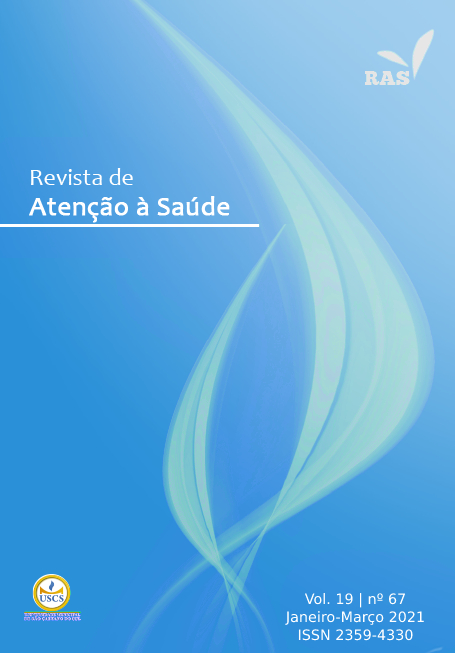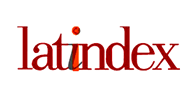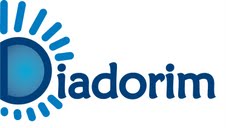Obesidade e sua influência sobre o câncer: uma recente revisão da literatura
DOI:
https://doi.org/10.13037/ras.vol19n67.7362Palavras-chave:
Obesidade, Neoplasia, Alimentação, Atividade físicaResumo
Introdução: As taxas de obesidade têm aumentado em todo o mundo, sendo atualmente essa
condição reconhecida como a principal causa evitável de vários tipos de câncer. Objetivo:
Portanto, procurou-se realizar um levantamento das características clínicas que relacionam a
obesidade e os diferentes tipos de câncer, entre os anos de 2017 e 2020. Materiais e Métodos:
Revisão integrativa da literatura, com buscas de evidências nas bases de dados PubMed, Scielo
e LILACS, cuja questão norteadora foi: "Qual a sobre a influência da obesidade em relação
aos diferentes tipos de câncer?". Resultados e Conclusões: Foram identificados 32 artigos,
dos quais 8 foram selecionados. A gordura corporal foi enfatizada como um fator de grande
impacto no desenvolvimento de neoplasias. Os dados sugerem que quatro em 10 tipos de
câncer são evitáveis por meio de mudanças no comportamento e padrão alimentar do indivíduo.
Estudos epidemiológicos têm mostrado uma forte ligação entre o fator dietético e a incidência
e prognóstico do câncer. Considerando que a dieta e o exercício físico são fatores modificáveis,
os projetos e as intervenções nos cuidados primários são essenciais para a prevenção da doença.
O entendimento dos mecanismos biológicos explica como um comportamento saudável
promove melhorias, destacando-se a importância da disseminação da informação às
populações de risco e na implementação de estratégias que ajudem os pacientes a fazer escolhas
melhores e mais saudáveis.
Downloads
Referências
Report of a WHO Consultation (WHO Technical Report Series 894), 2000.
World Cancer Research Foundation. American Institute for Cancer Research. Food, nutrition, physical activity and the prevention of cancer: a global perspective. Washington: American Institute for Cancer Research, 2007.
Argolo DF, Hudis CA, Iyengar NM. The Impact of obesity on breast cancer. Curr Oncol Rep Brazil. 2018; 20(6): 47.
Freisling H, Arnold M, Soerjomataram I, O'doherty MG, Ordóñez-Mena JM, et al. Comparison of general obesity and measures of body fat distribution in older adults in relation to cancer risk: meta-analysis of individual participant data of seven prospective cohorts in Europe. Br J Cancer. 2017; 116(11): 1486-1497.
Pearson-Stuttard J, Zhou B, Kontis V, Bentham J, Gunter MJ, et al. Worldwide burden of cancer attributable to diabetes and high body-mass index: a comparative risk assessment. Lancet Diabetes Endocrinol. 2018; 6(2): 95-104.
Ackerman SE, Blackburn OA, Marchildon F, Cohen P. Insights into the link between obesity and cancer. Curr Obes Rep. 2017(6): 195-203.
Siegel, RL, Miller, KD. Jemal, A. (2015). Cancer statistics, 2015. CA: a câncer Journal for clinicians, 65(1), 5-29.
Sung, H, Ferlay, J, Siegel, RL, Laversanne, M, Soerjomataram, I, Jemal, A, & Bray, F. (2021). Global cancer statistics 2020: GLOBOCAN estimates of incidence and mortality worldwide for 36 cancers in 185 countries. CA: A Cancer Journal for Clinicians).
Carvalho DDNR, De Aguiar VFF, Neresmartins JD, Bendelaque DDFR, Sardinha DM, et al. Cancer mortality in the north region of Brazil in the historical series. 2010-2017. IJAERS. 2020; 7(3): 174-181.
Oliveira AF, Quadros CA, de Castro Ribeiro HS, Wainstein AJA, de Queiroz Sarmento, et al. (2021). Global Forum of Cancer Surgeons: Support for the Brazilian Society of Surgical Oncology Journey towards Implementation of Cytoreductive Surgery/Hyperthermic Intraperitoneal Chemotherapy in Brazil. Annals of Surgical Oncology).
Rezende LFM, Arnold M, Rabacow FM, Levy RB, Claro RM, et al. The increasing burden of cancer attributable to high body mass index in. Cancer Epidemiol. 2018; 28; 54:63-70.
Fiolet T, Srour B, Sellem L, Kesse-Guyot E, Allès B, et al. Consumption of ultra-processed foods and cancer risk: results from NutriNet-Santé prospective cohort. BMJ. 2018; 14; 360: k322.
Armbruster S, Solimen PT. Public knowledge of obesity and gynecologic cancer risk. In: Berger N, Klopp A, Lu K. (eds) Focus on gynecologic malignancies. Energy Balance and Cancer. 2018; 13. Springer, Cham.
Tabung FK, Liu L, Wang W, Fung TT, Wu K, et al. Association of dietary inflammatory potential with colorectal cancer risk in men and women. JAMA Oncol. 2018; 4(3): 366-373.
Silva DAS, Tremblay MS, Souza MDFMD, Mooney M, Naghavi M, et al. Mortality and years of life lost by colorectal cancer attributable to physical inactivity in Brazil (1990-2015): Findings from the Global Burden of Disease Study. PLoS One. 2018; 13(2): e0190943.
Guitierrez-Salmeron M, Chocarro-Calvo A, García-Martinez JM, De La Vieja A, Garcia-Gimenez C. Epidemiological bases and molecular mechanisms linking obesity, diabetes, and cancer. Endocrinol Diabetes Nutr. 2017; 64(2): 109-117.
Akbari ME, Gholamalizadeh M, Doaei S, Mirsafa F. FTO gene affects obesity and breast cancer through similar mechanisms: a new insight into the molecular therapeutic targets. Nutr Cancer. 2018; 70(1): 30-36.
Olson OC, Quail DF, Joyce JA. Obesity and the tumor microenvironment. Science. 2017; 358(6367): 1130-1131.
Aguirre-Portoléz C, Fernandéz L, Molina A. Precision nutrition for targeting lipid metabolism in colorectal cancer. Nutrients. 2017; 9(10): 1076.
Freitas-Alves DR, De Andrade Vieira-Monteiro H, Piranda DN, Sobral-Leite M, Da Silva TSL, et al. PTGS2 polymorphism rs689466 favors breast cancer recurrence in obese patients. Endocr Relat Cancer. 2018; 25(3): 351-365.
Breyer JZ, Wendland EM, Kops NL, Caleffi M, Hammes LS. Assessment of potential risk factors for breast cancer in a population in southern Brazil. Breast Cancer Res Treat. 2018; 169(1): 125-131.
Queiroz de Sousa IM, De Melo Silva FR, De Oliveira Lyra C, Fayh PT. Nutritional and environmental risk factors for breast cancer: a case-control study. Sci med. 2018; 28(2): ID28723.
Milliron BJ, Bruneau M, Obeid E, Gross L, Bealin L, et al. Diet assessment among men undergoing genetic counseling and genetic testing for inherited prostate cancer: Exploring a teachable moment to support diet intervention. Prostate. 2019; 79(7): 778-783.
Almeida L, Santos BT, Prates RP, Leão LL, Pereira JV, et al. Alimentação como fator de risco para câncer de intestino em universitários. RBPS. 2017; 30(1): 72-78.
Lopez-Suaréz AL. Burden of cancer attributable to obesity, type 2 diabetes and associated risk factors. Metabolism. 2019; 92: 136-146.
Stern MC. Diet, physical activity, obesity and related cancer risk: strategies to reduce cancer burden in the Americas. Salud Publica Mex. 2019; 61(4): 448-455.
Giovannucci E A. framework to understand diet, physical activity, body weight, and cancer risk. Cancer Causes Control. 2018; 29: 1-6.
Yang YC, Johnson MP, Schorpp KM, Boen CE, Harris KM. Young adult risk factors for cancer: Obesity, inflammation, and sociobehavioral mechanisms. Am J Prev Med. 2017; 53(3S1): S21-S29.
Ludwig - Cancer Research Nutrition and Cancer Prevention Collaborative Group - UK. Cancer research nutrition and cancer prevention collaborative group. Current opportunities to catalyze research in nutrition and cancer prevention - an interdisciplinary perspective. BMC Med. 2019; 17(1): 148.
Mehra K, Berkowitz A, Sanft T. Diet, physical activity, and body weight in cancer survivorship. Med Clin North Am. 2017; 101(6): 1151-1165.
Downloads
Publicado
Edição
Seção
Licença
Direitos autorais (c) 2021 Carolina Freitas, Sr., Sra., Sra.

Este trabalho está licenciado sob uma licença Creative Commons Attribution-NonCommercial-ShareAlike 4.0 International License.
Proposta de Política para Periódicos que oferecem Acesso Livre Adiado
Autores que publicam nesta revista concordam com os seguintes termos:
- Autores mantém os direitos autorais e concedem à revista o direito de primeira publicação, com o trabalho licenciado simultaneamente sob uma licença
https://creativecommons.org/licenses/by-nc-nd/4.0/, permitindo o compartilhamento do trabalho com reconhecimento da autoria do trabalho e publicação inicial nesta revista.
- Autores têm autorização para assumir contratos adicionais separadamente, para distribuição não-exclusiva da versão do trabalho publicada nesta revista (ex.: publicar em repositório institucional ou como capítulo de livro), com reconhecimento de autoria e publicação inicial nesta revista.
- Autores têm permissão e são estimulados a publicar e distribuir seu trabalho online (ex.: em repositórios institucionais ou na sua página pessoal) a qualquer ponto antes ou durante o processo editorial, já que isso pode gerar alterações produtivas, bem como aumentar o impacto e a citação do trabalho publicado (Veja O Efeito do Acesso Livre).









